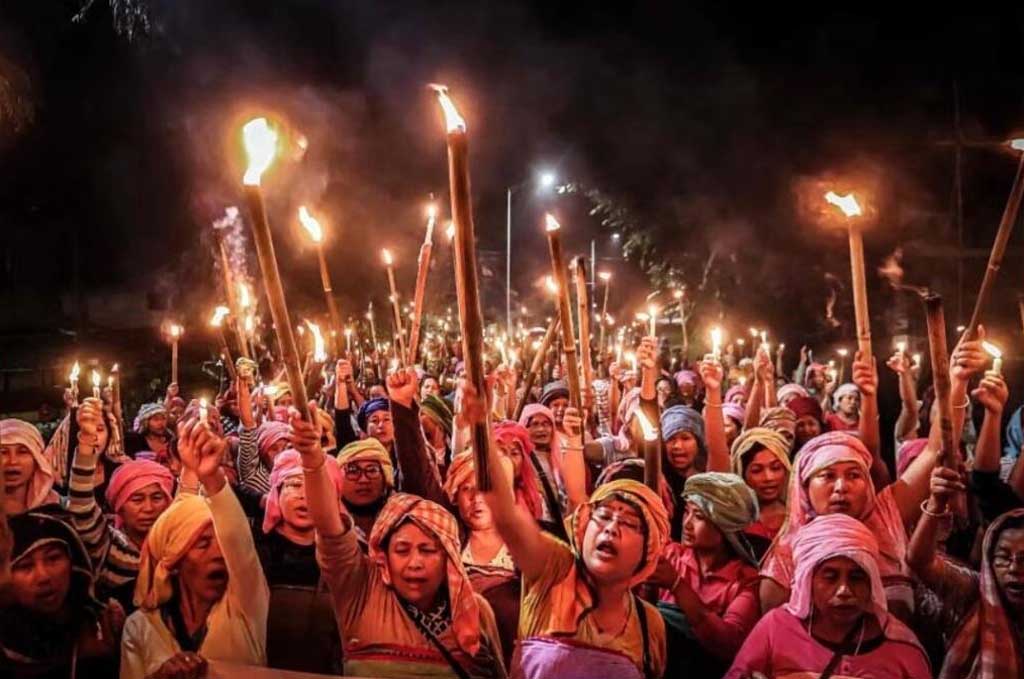Opinion: Manipur conflict is a setback for Act East Policy
The Manipur conflict has impacted the State’s socioeconomic standing, and brought a noticeable slowdown in Act East initiatives

By Leivon Victor Lamkang, Dr Karamala Areesh Kumar
India initiated the Look East Policy in the 1990s to explore economic prospects outside of South Asia in response to the financial problems posed by the dissolution of the Soviet Union and the Gulf crisis of 1990-1991. This policy was in line with liberalisation, globalisation and privatisation (LPG) activities. By adopting the Act East Policy in 2014, the NDA government improved India’s standing and level of international participation. However, there has been a great deal of violence in the ongoing Manipur conflict, which began in early May 2023, between the Kuki and Metei communities.
The continuous battle reached a new level with the use of highly sophisticated weapons like drones and rocket-propelled grenades (RPGs) to bomb civilian residences. After over a year and a half of fighting, more than 226 people have died, and 60,000 have been rendered homeless. Significant decisions were made in the State and the Centre during this battle. For example, the 16 km Free Movement Regime (FMR) was removed, and the 1,643 km Indo-Myanmar border was fenced.
Progress has been hampered by these contentious choices and the continuous unrest in the region, which harms ASEAN and Myanmar’s relations with India. Hence, this impedes the smooth execution of diverse socio-economic initiatives associated with various Act East Policy initiatives.
Free Movement Regime, Fencing
Scholars charge that the government’s decision to end the Free Movement Regime (FMR) and fence off the 1,643-kilometre Indo-Myanmar border was made with short-term gain in mind, jeopardising long-term considerations. With the adoption of this judgement, the numerous Indo-Myanmar ethnic link groups of Nagas and other Chin-Kuki communities — whose territories were split by colonial topographical demarcations — have ended.
This led to a variety of insurgent groups opposing such measures, including the Suspension of Operation groups (SOO), which is made up of 25 Kuki insurgent groups, and the National Socialist Council of Nagaland-Isak-Muivah (NSCN-IM), among other surrounding States.
The FMR is being implemented to facilitate trade by leveraging geographical proximity to Myanmar, improving people’s engagement, and allowing free movement. As a result, the government’s decision demonstrates a lack of clarity on the abovementioned principles, which will have a detrimental effect on India’s future relations with Myanmar, a crucial ally in its diplomatic efforts with most Southeast and East Asian nations.
Every development project involving ethnic communities, who take pride in their advantageous location for inroad transportation, must collaborate with the government. The tribal people may be against taking these actions because they have conflicting interests in keeping the border secure and eradicating FMR in the region.
The government’s choice will immediately affect cultural and sociological affinities, as well as the long-standing NSCN-IM demand for Greater Nagalim. Moreover, the border fence and the removal of FMR are directly at odds with the Act East ideals of fostering people-to-people ties with Myanmar and Southeast Asia.
Security and Stability
Development relies heavily on security and stability to develop infrastructure and enforce unrestricted traffic along existing transportation routes. However, a central contributing element was the lack of security even before the Manipur conflict. While the Manipur government started programmes like GPS-equipped highway patrol cars and peace-building initiatives, these only had short-term benefits. This security concern in the area is made worse by the ongoing violence in Manipur. As such, it mitigates the adverse effects of the Act East Policy on intercultural communication and interpersonal relationships.
The government’s decision to end the Free Movement Regime and fence off the 1,643-kilometre Indo-Myanmar border is jeopardising long-term considerations
Integrating economic goals to boost investment and trade is the primary component of Act East. But the conflict undermines investors’ interest in the region and harms the State’s reputation in India. Delegates from Myanmar and Thailand frequently voice concerns about extortion and insurgency along the roadways, indicating that security is still a serious worry.
Inter-State Tensions
States like Mizoram, Assam and Nagaland border Manipur. This State has ties to other ethnic groups in addition to shared geography. Due to Mizoram’s current ethnic involvement in the conflict — also known as Chin-Kuki-Mizo, since their ethnic identity is found chiefly in both Manipur and Mizoram — inter-State hostility has increased.
Tensions are highlighted by the situations in which the political leaders of the two States exchange disparaging remarks. Many Act East Policy-related development projects, like the Kalyan Multi-Modal Transit Transport Project, which involves road, rail and marine transportation across Manipur and Mizoram, have been delayed due to this tension.
Additionally, it interferes with coordinating internal security measures to limit cross-border insurgency and trafficking, which have been significant obstacles to implementing numerous regional initiatives.
Projects on Halt
Multiple development projects under Act East have been postponed due to the ongoing violence in Manipur. The State’s unstable security situation has raised concerns over the safety and security of employees. The Jiribam-Imphal Railway line, which aims to facilitate easier access to Southeast Asia, is one of the numerous ongoing projects being slowed down. Another is in Moreh, a small town on the Indo-Myanmar border, where the central government has attempted to build a profitable trade hub as part of the Asian highway network.
Regulatory obstacles, operational setbacks and discouragement of investment have hampered the construction of proposed airports and aviation projects. The increasing number of insurgents on the border has created security challenges for improvements to border infrastructure. Furthermore, the rebellion of numerous insurgent groups against the Juntas has resulted in cross-border terrorism, which also contributes to the cross-border conflict.
The success of any policy depends on the State’s stability. Not just the State’s socioeconomic standing is impacted, but there has also been a noticeable slowdown in the numerous Act East initiatives. Only through mediation can this chaos be turned back to normal. It is essential to find a means to end the animosity between the two ethnic groups and move towards a more cooperative resolution. Violence will only impact communities and the State, seriously hindering efforts related to the Act East Policy from being implemented.

(Leivon Victor Lamkang is Research Scholar, Department of Politics and International Studies, Pondicherry University. Dr Karamala Areesh Kumar is Head, Department of International Relations, Peace and Public Policy, St Joseph’s University, Bengaluru)
Related News
-
Teenager ends life upset over poor performance in NEET in Telangana’s Adilabad
20 mins ago -
Marco star’s next chapter: Unni Mukundan steps behind the camera
50 mins ago -
Naxalites kill deputy sarpanch in Chhattisgarh’s Sukma
54 mins ago -
Hyderabad: Minor girl ends life in Hayathnagar
1 hour ago -
This was our best bowling, fielding performance so far: SRH head coach Vettori
1 hour ago -
Delhi Capitals lost the momentum, says Bangar
1 hour ago -
Kiara Advani flaunts baby bump in custom Gaurav Gupta couture at Met Gala
2 hours ago -
Shah Rukh Khan makes Met Gala debut in Sabyasachi ensemble
2 hours ago




